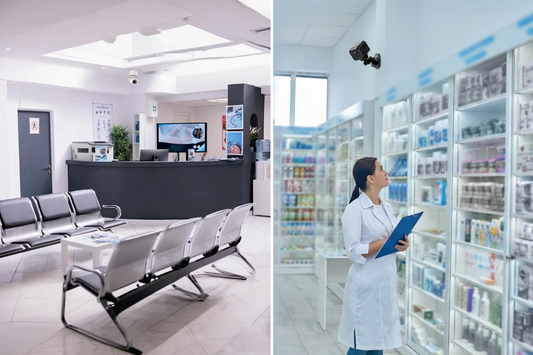
Smart Camera Setup for Pharmacies & Clinics in Pakistan
Smart surveillance technology is rapidly transforming how pharmacies and medical clinics operate across Pakistan. From improving security and regulatory compliance to optimizing staff performance, smart camera systems are now a key component of modern healthcare infrastructure. They combine high-definition imaging, artificial intelligence (AI), and real-time analytics to ensure every activity within a facility is monitored efficiently and responsibly.
With the rising demand for automation and digital security, healthcare spaces in Pakistan are upgrading from traditional CCTV systems to AI-powered smart camera networks—designed to protect people, assets, and data while meeting evolving industry standards.
Why Smart Surveillance Matters in Healthcare
Pharmacies and clinics handle sensitive areas like medicine counters, cash points, and consultation rooms—zones where accuracy and accountability are essential. Traditional CCTV setups record incidents but do little to prevent them. Smart cameras, on the other hand, can detect unusual motion, recognize faces, and send instant alerts to managers or security personnel.
For pharmacies, this means tighter control over restricted medications and storage areas. For clinics, it ensures safer patient interactions, reduced liability, and better overall supervision. These benefits make smart surveillance a proactive safeguard rather than a passive observer.
Core Components of a Smart Camera Setup
A professional-grade setup typically integrates AI cameras, analytics software, and secure network infrastructure. Below are the main components used in Pakistan’s healthcare environments:
1. AI-Powered IP Cameras
IP-based smart cameras transmit video data securely over the network and support mobile viewing.
Pharmacies: Dome cameras near counters and shelves help track customer flow and prevent unauthorized handling.
Clinics: PTZ (Pan-Tilt-Zoom) cameras in waiting areas or corridors provide wide coverage without multiple units.
2. Network Video Recorder (NVR) with AI Features
An AI-ready NVR is the system’s command center. It handles real-time analysis, such as detecting restricted access or identifying faces.
Modern NVRs in Pakistan can integrate with mobile apps to send instant push notifications or playback alerts for incidents.
3. Edge-Based Intelligence
Edge analytics allow cameras to process footage internally rather than relying entirely on the cloud. This saves bandwidth and delivers instant detection, such as identifying someone entering a medicine vault outside working hours.
4. Data Storage & Video Retention
Healthcare-related businesses are expected to maintain video logs for compliance.
A balanced approach combines on-site NVR storage for quick retrieval and cloud backups for long-term evidence retention.
Encryption and secure logins protect footage from unauthorized access.
5. Reliable Power & Network Support
Power fluctuations are common across Pakistan, making UPS or solar power integration essential for continuous recording. Network connectivity should use stable, high-bandwidth routers to support simultaneous remote streams without frame drops.
Designing an Effective Layout
Pharmacy Example
- Entrance & Counter: Face-recognition dome camera.
- Dispensing Zone: Bullet camera with motion alerts.
- Cold Storage: Temperature-sensing camera linked with sensors.
- Exit: Outdoor camera with night vision and motion detection.
Clinic Example
- Reception: PTZ camera for wide coverage.
- Consultation Rooms: Compact corner camera with privacy mode.
- Pharmacy Section: Fixed camera with line-crossing alerts.
- Exterior: Weatherproof infrared cameras for 24/7 protection.
An optimized layout ensures complete coverage with zero blind spots, while maintaining ethical recording boundaries in private medical areas.
Network & Cybersecurity Configuration
Smart cameras are part of the Internet of Things (IoT), meaning they’re connected to networks and need strong protection.
Best practices include:
- Creating a dedicated VLAN for cameras to isolate traffic.
- Enabling two-factor authentication for admin access.
- Applying firmware updates regularly to prevent vulnerabilities.
- Encrypting all streams with HTTPS or SSL.
- Using strong passwords instead of factory defaults.
These precautions safeguard clinics and pharmacies from data breaches or system hijacking.
Integration with Digital Management Systems
Modern smart camera setups integrate seamlessly with POS or clinic management software.
- Attendance Tracking: Verify pharmacist or staff logins through face capture.
- Queue Management: Monitor patient flow using people-counting analytics.
- Inventory Oversight: Link motion sensors with surveillance feeds to detect unauthorized handling of stock.
This synergy between AI surveillance and digital management creates a smarter, more efficient healthcare environment.
Compliance & Ethical Recording
Pakistan’s Drug Regulatory Authority (DRAP) recommends electronic surveillance for controlled substances and pharmacy operations.
However, compliance also includes respecting privacy:
- Always display “CCTV in Operation” signs.
- Avoid audio recording in consultation rooms.
- Grant video access only to authorized administrators.
- Smart surveillance should serve safety and transparency, not intrusion.
- Maintenance & Performance Optimization
- Smart camera systems perform best with regular care.
- Quarterly inspections to clean lenses and verify network stability.
- System alerts for offline cameras or storage issues.
- Bandwidth optimization by adjusting frame rates (e.g., 20fps).
- Hardware checks for power backup and surge protection.
A proactive maintenance plan ensures that cameras continue to deliver accurate analytics and clear footage over time.
Building a Smarter, Safer Healthcare Space
Smart camera setups are no longer luxury add-ons—they are vital digital assets for healthcare facilities in Pakistan. Whether installed in a single-store pharmacy or a multi-floor clinic, these systems strengthen compliance, improve staff accountability, and create safer environments for patients and professionals alike.
Brands like Okasha Smart are driving this transformation by providing scalable, AI-enabled security solutions tailored to Pakistan’s unique conditions—bridging technology, healthcare, and trust.